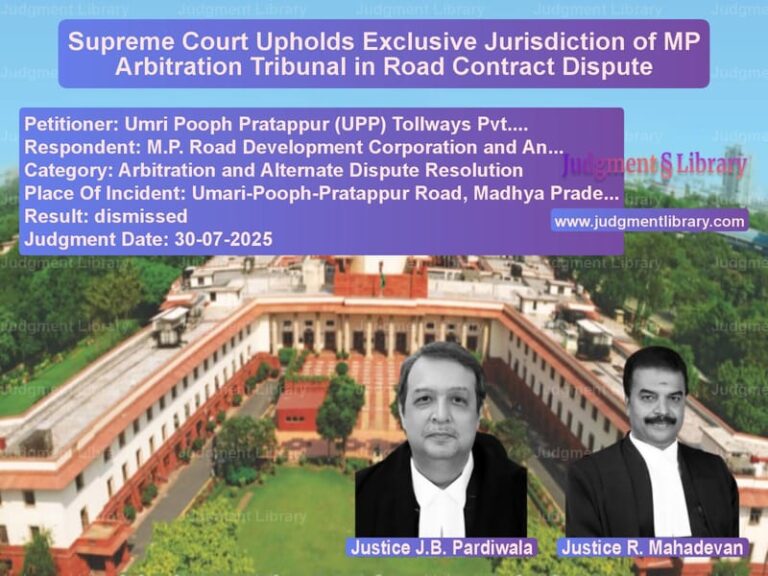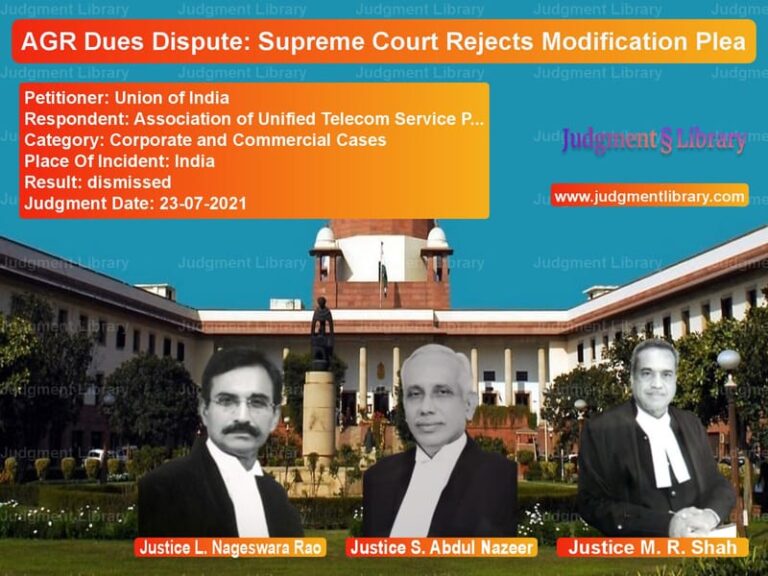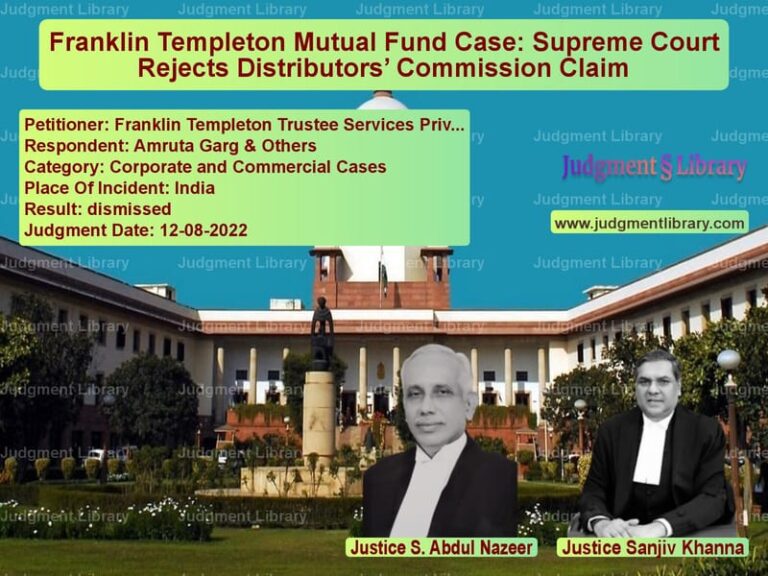Supreme Court Restores 18% Interest in Larsen Arbitration Dispute Against Union of India
The Supreme Court of India recently ruled in favor of M/s Larsen Air Conditioning and Refrigeration Company, setting aside the Allahabad High Court’s modification of an arbitral award. The judgment, delivered by S. Ravindra Bhat and Dipankar Datta, reinstated the original 18% per annum compound interest awarded by the arbitrator, emphasizing that courts cannot modify arbitral awards under the Arbitration and Conciliation Act, 1996.
The ruling provides clarity on the scope of judicial interference in arbitral proceedings, reaffirming that courts have limited power under Section 34 of the Act to set aside awards but cannot alter them.
Background of the Case
The case arose from a contractual dispute between Larsen Air Conditioning and Refrigeration Company and the Union of India. The appellant had undertaken work under a government tender, but disputes regarding payments and delays led to arbitration. The arbitral tribunal ruled in favor of the appellant, awarding compensation along with 18% compound interest on eight claims.
Chronology of Events
- April 22, 1997: The respondent-state referred the dispute to arbitration.
- October 24, 1998: Arbitration proceedings concluded.
- January 21, 1999: Arbitral tribunal awarded compensation with 18% compound interest.
- March 6, 2003: District Court dismissed the respondent-state’s challenge under Section 34 of the Arbitration and Conciliation Act, 1996.
- July 17, 2019: Allahabad High Court reduced the interest from 18% compound to 9% simple interest.
- August 11, 2023: Supreme Court restored the 18% compound interest as originally awarded.
Petitioner’s Arguments
The appellant, represented by Senior Counsel Neeraj Singh, contended:
- The arbitral tribunal had already reduced their original claim of 24% interest to 18%.
- Section 31(7)(b) of the Arbitration and Conciliation Act, 1996, mandated a default rate of 18% interest unless the award specified otherwise.
- The arbitrator had full discretion to award interest, and the courts could not modify the award.
- The district court correctly upheld the award, but the High Court exceeded its jurisdiction by reducing the interest rate.
- The contract did not contain any clause prohibiting interest payments.
Respondent’s Arguments
The Union of India, represented by Additional Solicitor General Vikramjit Banerjee, countered:
- The 18% compound interest was excessive and unreasonable.
- Past Supreme Court rulings had permitted courts to reduce excessive interest rates.
- The appellant’s counsel had conceded in earlier proceedings that statutory interest rates should be closer to market lending rates (7-8%).
- The High Court had rightfully exercised discretion in modifying the award.
Supreme Court’s Analysis
The Supreme Court ruled in favor of the appellant, holding that courts have no authority to modify arbitral awards. The Court observed:
“Under Section 34, a court can only set aside an arbitral award on limited grounds such as patent illegality or denial of natural justice. The power to modify an award does not exist.”
1. Statutory Interest Rate of 18%
The Court held that the pre-amended Section 31(7)(b) of the Arbitration Act, 1996, provided a default interest rate of 18% per annum:
“A sum directed to be paid by an arbitral award shall, unless the award otherwise directs, carry interest at the rate of eighteen per centum per annum.”
2. Limited Scope of Judicial Intervention
The Court reaffirmed that the judiciary cannot rewrite or alter awards:
“Unlike the old Arbitration Act, 1940, the 1996 Act consciously omits the power to modify an award. Courts can set aside an award but not alter it.”
3. Precedents on Interest Modification
The judgment cited past cases where courts upheld the arbitrator’s discretion:
- Shahi v. State of U.P. (2019): Upheld 18% interest as reasonable under the 1996 Act.
- G.C. Roy (1991): Arbitrators have the discretion to award pendente lite interest.
- National Highways Authority v. M. Hakeem (2021): Courts lack the power to modify awards.
Final Verdict
The Supreme Court ruled:
- The High Court’s decision reducing interest to 9% was set aside.
- The original arbitral award of 18% compound interest was restored.
- The Union of India was directed to pay the outstanding amount within 8 weeks.
- The decision reaffirmed the autonomy of arbitral tribunals in awarding interest.
This ruling strengthens the finality of arbitration and limits judicial interference, reinforcing India’s pro-arbitration stance.
Petitioner Name: M/s Larsen Air Conditioning and Refrigeration Company.Respondent Name: Union of India & Ors..Judgment By: Justice S. Ravindra Bhat, Justice Dipankar Datta.Place Of Incident: Allahabad, Uttar Pradesh.Judgment Date: 11-08-2023.
Don’t miss out on the full details! Download the complete judgment in PDF format below and gain valuable insights instantly!
Download Judgment: ms-larsen-air-condi-vs-union-of-india-&-ors-supreme-court-of-india-judgment-dated-11-08-2023.pdf
Directly Download Judgment: Directly download this Judgment
See all petitions in Arbitration Awards
See all petitions in Dispute Resolution Mechanisms
See all petitions in Judgment by S Ravindra Bhat
See all petitions in Judgment by Dipankar Datta
See all petitions in allowed
See all petitions in Modified
See all petitions in supreme court of India judgments August 2023
See all petitions in 2023 judgments
See all posts in Arbitration and Alternate Dispute Resolution Category
See all allowed petitions in Arbitration and Alternate Dispute Resolution Category
See all Dismissed petitions in Arbitration and Alternate Dispute Resolution Category
See all partially allowed petitions in Arbitration and Alternate Dispute Resolution Category







